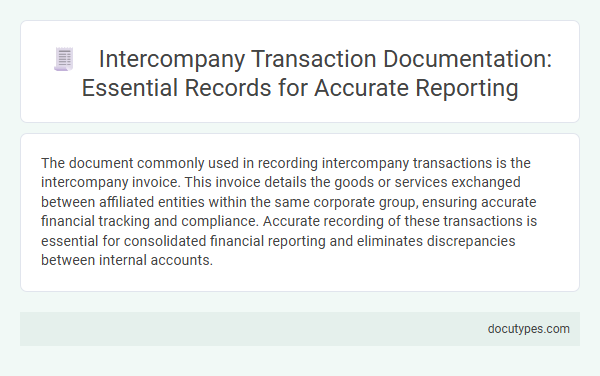The document commonly used in recording intercompany transactions is the intercompany invoice. This invoice details the goods or services exchanged between affiliated entities within the same corporate group, ensuring accurate financial tracking and compliance. Accurate recording of these transactions is essential for consolidated financial reporting and eliminates discrepancies between internal accounts.
Introduction to Intercompany Transaction Documentation
What document is used in recording intercompany transactions? Intercompany transaction documentation is crucial for maintaining clear and accurate records between affiliated entities. Your financial reports rely on these documents to ensure transparency and compliance with accounting standards.
Importance of Accurate Intercompany Records
The primary document used in recording intercompany transactions is the intercompany invoice, which details the goods or services exchanged between affiliated entities. Accurate intercompany records ensure compliance with regulatory standards and prevent discrepancies in consolidated financial statements. Maintaining precise documentation protects your company from audit risks and supports transparent financial reporting across the organization.
Key Types of Intercompany Transactions
Intercompany transactions require accurate documentation to ensure proper financial reporting and compliance within consolidated entities. Key documents facilitate transparency and traceability for different types of intercompany activities.
- Intercompany Invoices - Standard documents used to record sales and purchases of goods or services between related entities.
- Transfer Pricing Agreements - Contracts that define pricing methods for intercompany transactions to comply with tax regulations.
- Intercompany Loan Agreements - Legal documents outlining terms and conditions for loans or advances between affiliated companies.
Effective documentation streamlines reconciliation and audit processes for intercompany transactions.
Essential Documents for Intercompany Transactions
Intercompany transactions require specific documents to ensure accurate recording and compliance with accounting standards. Your organization must identify these essential documents to maintain transparency in financial reporting.
- Intercompany Invoices - These documents detail the goods or services exchanged between related entities and serve as primary records for transaction amounts.
- Intercompany Agreements - Formal contracts outline the terms and conditions governing intercompany transactions to avoid disputes and ensure consistency.
- Payment Vouchers - Payment confirmations validate the settlement of intercompany balances and support reconciliation processes.
Best Practices in Intercompany Agreement Drafting
The primary document used in recording intercompany transactions is the intercompany agreement, which outlines the terms and obligations between affiliated entities. Best practices in drafting these agreements include clearly defining transaction details, establishing pricing methods consistent with transfer pricing regulations, and specifying dispute resolution mechanisms. Ensuring your intercompany agreements are detailed and compliant minimizes risks and enhances transparency during financial reporting.
Transfer Pricing Documentation Requirements
Intercompany transactions require detailed documentation to comply with transfer pricing regulations globally. Transfer pricing documentation serves as the primary document used in recording and justifying these transactions between related entities.
This documentation typically includes a master file, local file, and country-by-country report to demonstrate adherence to the arm's length principle. Accurate transfer pricing documentation reduces the risk of tax adjustments and penalties during audits.
Audit Readiness: Organizing Supporting Records
Intercompany transactions require precise documentation to ensure audit readiness and transparency. The primary document used in recording these transactions is the intercompany invoice, which details the nature and value of exchanged goods or services between entities within the same corporate group.
Supporting records include contracts, payment vouchers, and reconciliation reports that validate each transaction's accuracy and completeness. Organizing these documents methodically strengthens your audit trail and facilitates efficient review processes during audits.
Common Challenges in Documenting Intercompany Transactions
Intercompany transactions require precise documentation to ensure accuracy and compliance across subsidiaries. Proper records prevent discrepancies in consolidated financial statements and support audit trails.
- Intercompany Invoices - These formal documents record the sale of goods or services between affiliated entities, serving as primary evidence for transaction occurrence and valuation.
- Transfer Pricing Agreements - Binding contracts outline pricing methods and terms applied to intercompany transactions, aiming to comply with tax regulations and avoid disputes.
- Reconciliation Statements - Detailed reports compare and resolve differences in transactions recorded by related parties, ensuring alignment and accuracy in intercompany balances.
Regulatory Compliance and Reporting Standards
Intercompany transactions are typically recorded using intercompany invoices, purchase orders, and reconciliation statements to ensure accuracy and traceability. These documents are essential for maintaining regulatory compliance and meeting reporting standards across consolidated financial statements.
Regulatory bodies such as the SEC and IFRS mandate thorough documentation to prevent misstatements and ensure transparency in financial reporting. Your accounting systems must capture detailed intercompany documentation to facilitate audit trails and consolidate financial data accurately. Ensuring compliance with GAAP or IFRS standards helps avoid penalties and supports seamless intercompany reconciliations during financial close processes.
What Document Is Used in Recording Intercompany Transactions? Infographic

